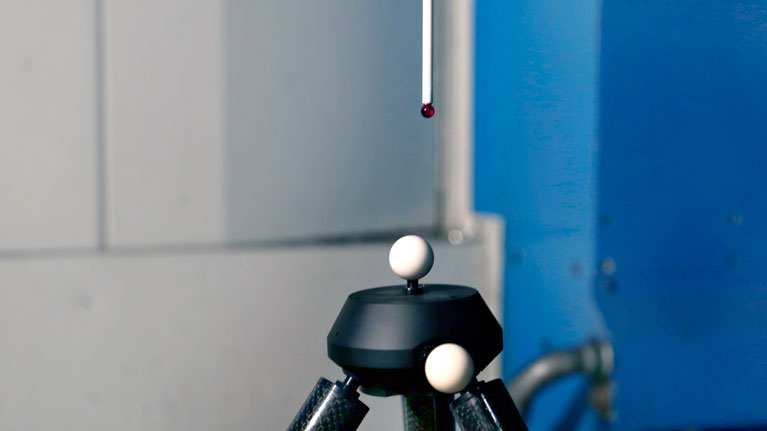From the laboratory to the production line
The “Metrology 4.0” concept defines new metrology trends in terms of meeting the needs of production environments to upgrade efficiency by using advanced and smart manufacturing and measuring processes.

Sectors such as aeronautics, shipbuilding or wind power that require increasingly larger and more sophisticated components as well as requirements arising from the “Industry 4.0” trend with regard to having to digitise production processes and products, are quickly removing metrology from the lab metrology in order to be taken to the production plant. The time is now ripe for metrology to progress even further to become a facilitator for “Industry 4.0”.
The “Metrology 4.0” concept defines new metrology trends in terms of meeting the needs of production environments to upgrade efficiency by using advanced and smart manufacturing and measuring processes. To this end, it is essential to have smart sensors monitoring production units to optimise the response of manufacturing processes on the line itself, to ensure product quality, shorten production cycles and reduce other associated costs.
The main requirements to be met for this interaction to happen between sensors and the process are linked to rapid data acquisition (contactless technologies), automatic processing of measurements (parametric programing), interpretation of results (decision-making models) and converting the results obtained (adaptation of the communication language) to communicate with the process monitoring system and eventually intervene.
To meet these demands, metrology systems together with hardware and software, are being adapted to this environment by incorporating new features that, until now, were unnecessary in a laboratory. A clear example of this tendency is related to the fact that leading suppliers of metrology equipment are increasingly leaning more towards selling solutions that are built into manufacturing processes.
Information of this kind allows for real-time decision-making whenever these critical parameters are modified and influence the end result of a process. This approach requires flexible measuring systems to automate and programme them in order to engage the monitoring methods applied until that point in time.
It is also necessary to develop a system that compiles and processes data and eventually takes a decision based on monitoring the most relevant features of the process. In other words, control systems must incorporate the process with a degree of accuracy and speed similar or event greater than what external verification and calibration methods have provided until now.
One of the biggest challenges we have to deal has to do with transferring the traceability of measuring procedures “from the laboratory to the production environment”, where many of the factors that are monitored in a laboratory (environmental conditions, machine geometry, sensor calibration, etc.), are not controlled and are even unknown due to the fact that it has not yet been necessary to characterise them.
Thermal variation, in fact, is the source of uncertainty that most significantly affects production and measuring systems as well as the part itself. The greater the thermal gradient and the larger the part, greater will be the geometric bias systems and components. Therefore, uncertainty in terms of manufacturing processes and on-site measuring processes is greater.
Metrology for predictive monitoring of production processes
In the automotive and aeronautical business there is clear tendency focused on mass dot acquisition based on using contactless digitising systems that make it possible to scan large volumes of information in short periods of time to deliver 100% of production monitoring capabilities.
It is in this new scenario where two needs have been noted that metrology will have to address in the near future. On the one hand, the management of large volumes of information (Big Data) mean that new hardware and software tools will have to be developed. It is the field in which quantum computers based on qubits and new logical ports are going to deliver mass date storage and management capabilities, a near future must for metrology.
On the other, “data is not equal to information”. It is therefore indispensable to develop action platforms and algorithms. These are the algorithms that will make it possible to define control indicators for data evaluation and decision-making. This will give rise to a data base allowing production processes to predict any biases and act preventively.
As happens with health in our lives, “metrology does not cover everything, although manufacturing does not make sense without it”.
Work is currently in progress with regard to the “manufacturing-measuring” binomial. By measuring components manufactured on a machine tool by means of built-in acquisition systems, such as point-to-point sensors or digitising sensors, it becomes possible to get to know a production process better, avoid faulty parts, perform predictive maintenance for production units and monitor any process biases.
In conclusion, industry 4.0 is all about digitising industry, particularly productive processes and the products and services resulting from them. Digitisation is also demanding that metrology be taken outside laboratories to production processes. It is a scenario in which there are a number of opportunities that metrology will have to address in the near future should it aspire to become a facilitator for Industry 4.0. In any case, metrology performed in laboratories under controlled environmental conditions and exhaustive measuring procedures will be irreplaceable in the near future as regards ensuring the traceability of measuring operations. It will also guarantee quality in the industry.
Gorka Kortaberria and Unai Mutilba, Responsible for Inspection and Measurement at IK4-TEKNIKER
